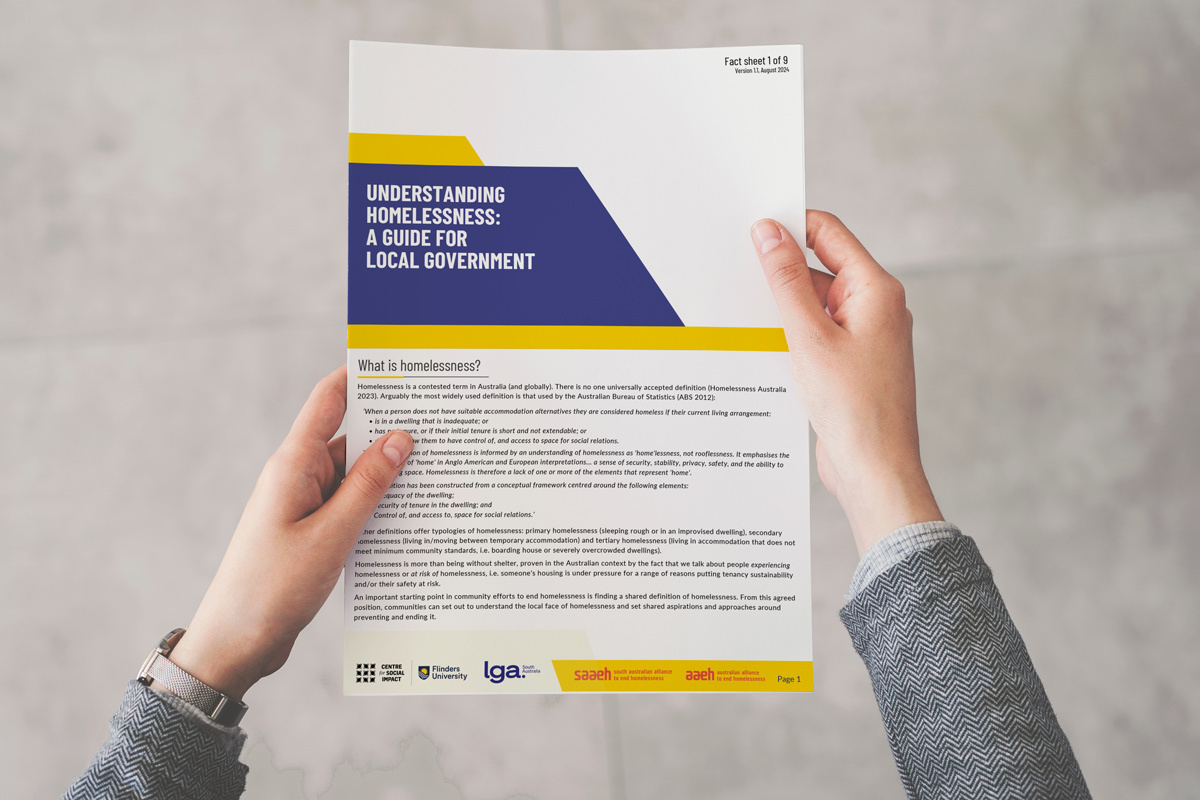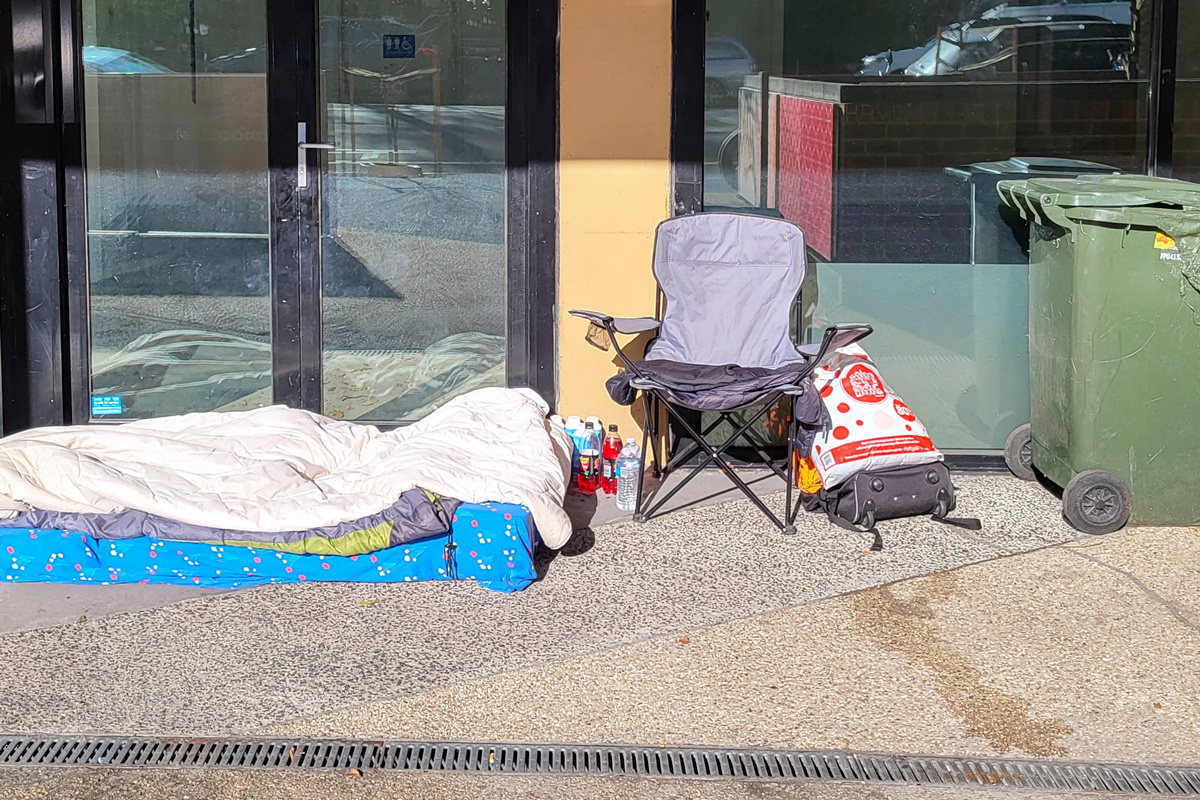Local Councils’ New Tool to Help Tackle Homelessness in Communities


As the housing and homelessness crisis deepens across Australia’s suburbs, local councils are increasingly relied upon to provide services and support to those who need it most.
To respond to this growing challenge, Flinders University’s Centre for Social Impact – with support of LGA South Australia, councils, the South Australian and Australian Alliances to End Homelessness and other stakeholders advancing efforts to end homelessness – has developed a new toolkit to help local governments in their efforts to tackle homelessness within their communities.
The Ending homelessness: a toolkit for local government is an evidence-based resource offering guidance for regional and metropolitan councils.
It outlines an approach to address homelessness, including responding to disaster-related homelessness, culturally safe practices, and ideas on how local government can play a proactive role in ending homelessness.
The toolkit comprises nine fact sheets, each with a different focus designed to assist councils with their thinking, actions and advocacy as they navigate this complex issue in their communities.
Fact sheets focus on topics including understanding homelessness, what it means to end homelessness, how councils can partner with other stakeholders for collective impact, the role councils can take in tackling homelessness, and ideas councils can consider or implement to assist in preventing homelessness in their communities.
A key benefit of the toolkit is the inclusion of real-world case studies, from both national and international contexts.
Such examples demonstrate how local governments can successfully implement initiatives to reduce homelessness and provide a roadmap for other councils to replicate.

Highlighting the experiences of City of Adelaide, Port Adelaide Enfield, City of Fremantle and City of Manchester, the toolkit illustrates the diverse strategies being employed at a local level.
Associate Professor Selina Tually, Deputy Director of Centre for Social Impact Flinders, said rising financial stress and lack of affordable housing had driven levels of homelessness to new heights across Australia.
She said the toolkit was created to help guide councils’ response to homelessness challenges in their areas, given they are the closest level of government to communities.
“The significant scale of Australia’s current housing crisis means councils are seeing more people experiencing or at risk of homelessness – often in areas where this was not seen before,” Associate Professor Tually said.
“While you may see some people sleeping rough, others aren’t as visible – they hide themselves away, out of sight.
“Most people experiencing homelessness in Australia are invisible to some extent, but they are there and need support.
“The fact sheets that comprise the new local government toolkit synthesise what we know from the ever-evolving academic and practice evidence about homelessness and how we can end it.”
On any given night, 122,494 people in Australia are experiencing homelessness.
One in seven people experiencing homelessness are children aged under 12, and 23 per cent of people experiencing homelessness – almost one in four – are children and young people between 12 and 24.
With more adults and children sleeping rough or in their cars or couch surfing than ever before, homelessness services are often overstretched and are reporting increased numbers of people seeking assistance being turned away due to lack of capacity.

Individually, and collectively alongside State Government and other support agencies, local councils have a key role to play in ending homelessness within their communities.
Councils have a deep understanding of their community’s needs, they can advocate across multiple levels of government, and they have input into creating and maintaining the right enabling environment for efforts to end homelessness through regulation and driving local economic development.
LGA South Australia CEO Clinton Jury said the toolkit was a valuable new resource for councils seeking more information and ideas on tackling homelessness in their suburbs and regions.
“Having safe, stable and appropriate housing is the foundation for good physical and mental health, employment, education and family, but the research tells us more and more people no longer have the means to afford a home due to the current crisis,” Mr Jury said.
“Of all the levels of government, local councils are closest to the communities they serve and have a deep understanding of the needs of their community.
“Councils have limited funding and don’t have a legislative mandate to address homelessness, but they recognise the devastating community need and growing visibility of homelessness and are responding.
“Equipping councils with information and resources in this toolkit can help ensure they are well-positioned to advocate for support and policy-making based on local priorities and needs.
“This builds even stronger communities and enables councils to join alongside other levels of government to tackle homelessness from multiple angles.”
CEO of the Australian Alliance to End Homelessness David Pearson reflected that the role everyone has to play to address homelessness.
“Homelessness is a solvable problem. This has been proven by local communities around the world, but there is no one program, policy, building, agency, organisation or level of government that can solve it on their own,” Mr Pearson said.
“It takes everyone in local communities working together to do that.”
Ending homelessness: a toolkit for local government was officially launched in Adelaide earlier this month following National Homelessness Week and to coincide with the Lord Mayor of Adelaide’s Homelessness Roundtable.
It has been designed with both regional and metropolitan councils in mind and can be used by councils right across Australia.
The toolkit is available to all councils across Australia and can be accessed here.
For further information about the toolkit, please contact Associate Professor Selina Tually, Deputy Director, Centre for Social Impact Flinders: selina.tually@flinders.edu.au



